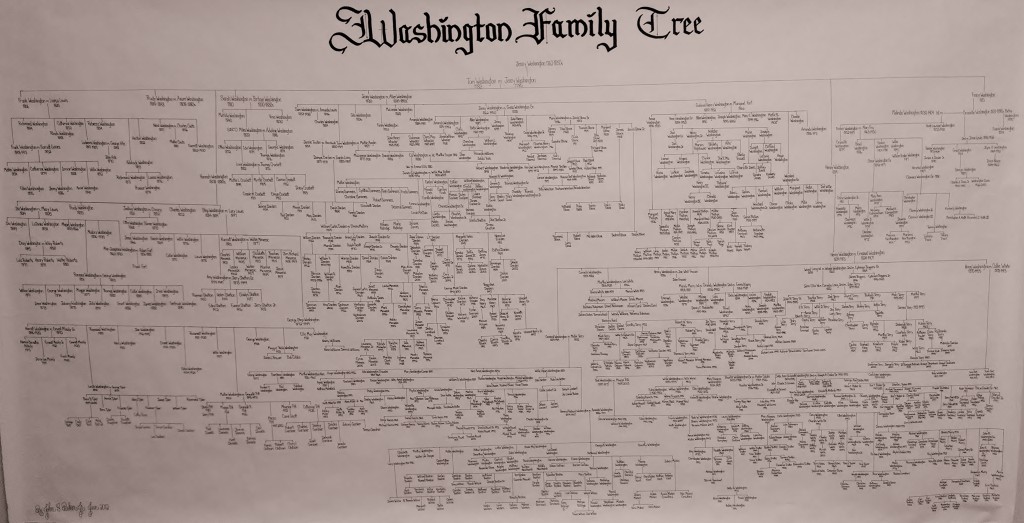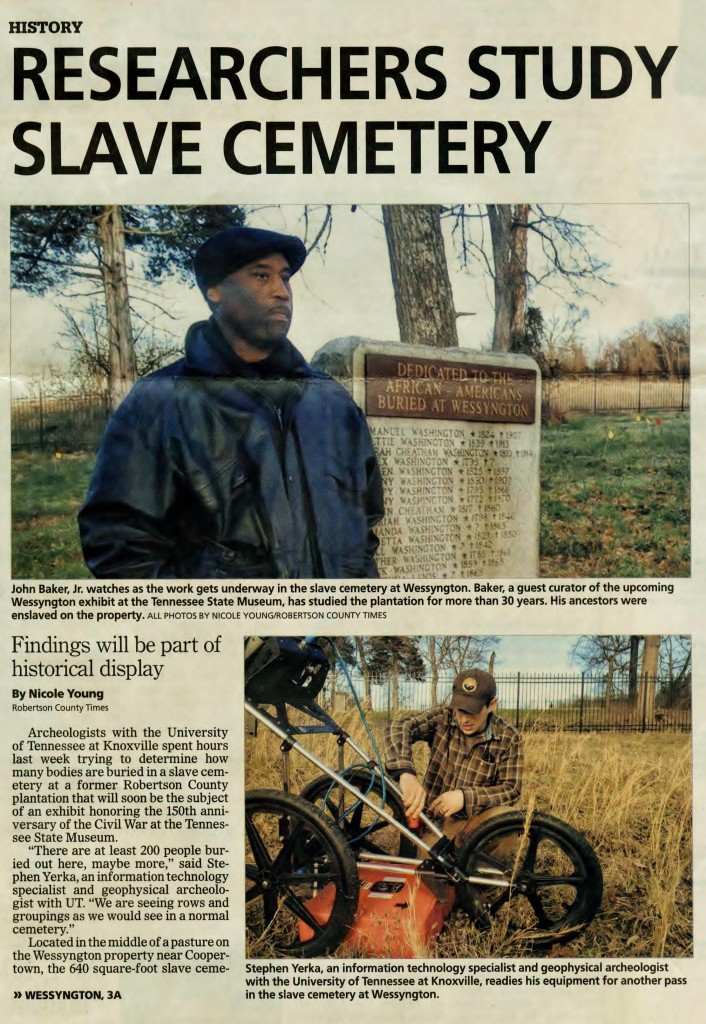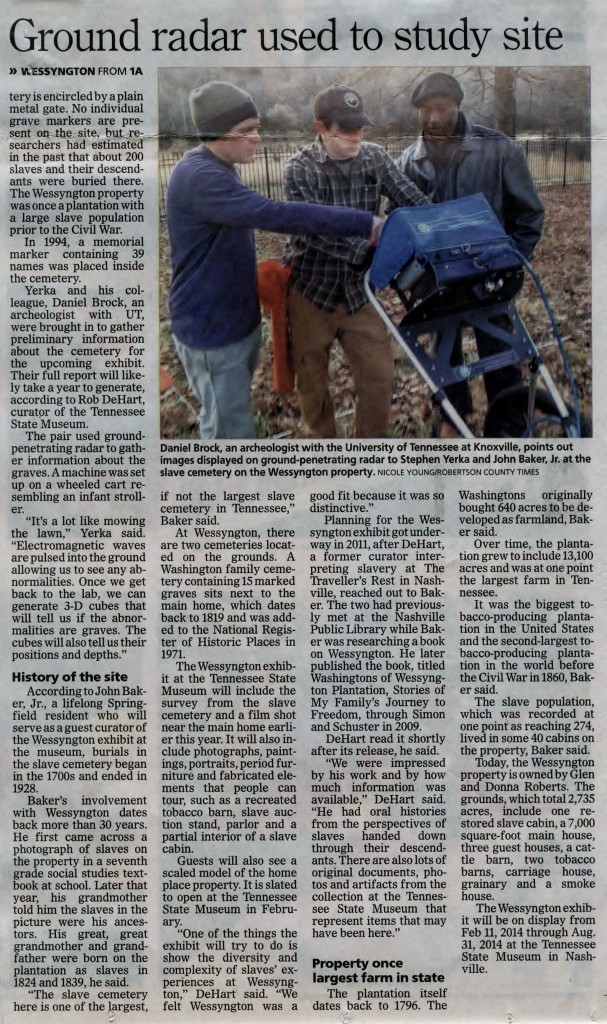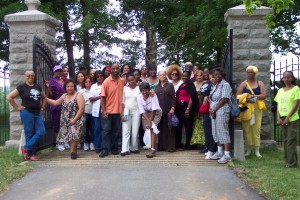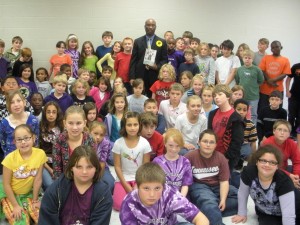On July 11th Nashville Public Television aired its documentary Wessyngton Plantation: A Family’s Road to Freedom. The film was inspired by my book The Washingtons of Wessyngton Plantation: Stories of My Family’s Journey to Freedom and the Tennessee State Museum exhibition Slaves and Slaveholders of Wessyngton Plantation. The documentary highlighted the life of my great-great-great-grandmother Jenny Blow Washington. Jenny along with her sister Sarah was brought from Sussex County, Virginia to Tennessee in 1802 by Joseph Washington who founded Wessyngton Plantation. Jenny married Godfrey a slave from a neighboring plantation and became the matriarch of one of the largest families on Wessyngton. Godfrey and Jenny later had nine children, including my great-great-grandfather Emanuel Washington (1824-1907). Today there are thousands of their descendants throughout the United States. Click link to view the documentary: http://www.youtube.com/watch?v=bdce9dud1c0
Posts Tagged ‘Civil War’
WESSYNGTON PLANTATION: A FAMILY’S ROAD TO FREEDOM
Saturday, July 12th, 2014African American Family Tree on Display at Tennessee State Museum Exhibit Slaves and Slaveholders of Wessyngton Plantation
Saturday, January 4th, 2014One of the items on display at the Tennessee State Museum exhibit Slaves and Slaveholders of Wessyngton Plantation will be a family tree of an enslaved family. The tree spans eleven generations from 1760 to 2012 and includes more than 1,000 direct descendants. In 1814, Wessyngton’s founder Joseph Washington (1770-1848) purchased six slaves from James Thompson: Tom born 1783, his wife Jenny born 1785, their four children Frank born 1806, Hannah born 1808, Sarah born 1810 and Henny born 1814. This was the first nuclear family Washington purchased. Washington later purchased Jenny’s mother, also named Jenny, born in 1760. By the Civil War, this was one of the largest families on Wessyngton Plantation. Many of their descendants still remain in the area. Hundreds of other descendants are spread throughout the United States.
Wessyngton Plantation African American Cemetery 1796 to 1928
Thursday, November 29th, 2012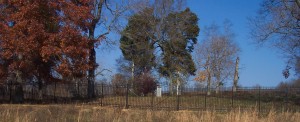
The African American Cemetery on Wessyngton Plantation was founded by Joseph Washington who came to Robertson County, Tennessee from Southampton County, Virginia in 1796. Joseph later returned to Virginia and brought African and African American slaves with him. The cemetery was used by the enslaved African American population of the plantation and their descendants from 1796 to 1928.
In 1995 a memorial monument at the African American Cemetery was erected by Mary Washington Holley, Thomas Blagden and Preston Frazer, direct descendants of Wessyngton’s founder Joseph Washington. It honors those buried there.
In 2012 a beautiful six-foot aluminum fence was erected to enclose and protect the cemetery. The fence adds charm and dignity to the cemetery. Special thanks go to Stanley Frazer Rose, a sixth generation descendant of Joseph Washington, for his generosity in funding this renovation.
The African American cemetery is located some distance from the Wessyngton mansion on a hill overlooking Caleb’s Creek. This is near where Joseph and his slaves first settled in 1796. The cemetery measures approximately 640 square feet and contains an estimated 200 graves. A geophysical survey using ground penetrating radar is planned to determine the actual number of graves in the cemetery. At that time, the original monument will be enlarged to honor all those who were buried in the cemetery. This monument will be funded in part by Mary Hotchkiss Gregg, Robina Gregg O’Rourke, Robert Etheridge Gregg, and Robert Hunnewell Gregg, sixth generation descendants of Joseph Washington.
Based on correspondence and plantation records from the Washington Family Papers collections, death certificates, oral history and eyewitnesses who attended burials at the cemetery, the following persons are known to be buried there:
Sampson Washington 1808 –1836
Caesar Washington 1826-before 1838
Elijah Washington 1823-before 1838
Matt Washington 1777-before 1838
Nicholas Washington 1822-before 1838
Noel Washington 1804-before 1838
Oscar Washington 1825-before1838
Peter Washington 1823-before 1838
Sam Washington 1770-before 1838
Sam Washington 1770-before 1838
Samuel Washington 1770-before 1838
Simon Washington 1783-1835-before 1838
Cherry Washington 1839-1839
Will Washington 1820-1841
Boyd Washington 1840-1846
Mariah Washington 1798-1846
Godfrey Washington 1787-1846-before 1850
Rosetta Washington 1827-1850
Camilla Lewis 1834-1852
Maria Washington 1853-1853
Wendy Washington 1853-1853
Westley Washington 1853-1853
Otho Lewis 1838-1854
Edward Washington 1834-before 1856
Al Washington ?-1838-before1856
Andrew Washington ?-1838-before 1856
Fowler Terry 1815-1838-before 1856
Simon Washington 1815-1838-before 1856
Toby Washington ?-1838-before 1856
Tony White 1820-1838-before 1856
Westley Washington 1822-1838-before 1856
Daniel Washington 1808-1841-before 1856
Wallis Washington 1822-1841-before 1856
Anthony Washington 1823-1843-before 1856
Archer Washington 1824-1843-before1856
Charles Washington 1809-1843-before 1856
George Lewis 1785-1843-before 1856
Jim Washington 1801-1844-before 1856
Aleck Washington 1795-1846-before 1856
Norfleet Washington 1846-before 1856
Tom Washington 1783-1846-before 1856
Gabriel Washington 1819-1850-before 1856
Dempry Washington 1837-1856
Ned Washington 1844-1856
Silvah Washington 1817-1823-before 1860
Charity Washington 1828-before 1860
Martha Ann Washington 1833-before 1860
Martha Washington 1835-before 1860
Sarah Washington 1840-before 1860
Arry Leavell Washington 1805-1841-before 1860
Sally Washington 1816-1829-before 1860
Mira Washington 1829-1842-before 1860
Sylvia Washington 1806-1842-before1860
Bena Washington 1770?-1844-before 1860
Tom Washington 1782-1846-before 1850
Easter Washington 1784-1850-before 1860
Henny Jackson Smith 1790-1850-before 1860
Jenny Washington 1760-1850-before1860
Unknown male 1785-1850-before 1860
Willie Washington 1820-1850-before 1860
Angelina Cheatham Washington 1814-1851-before 1860
Millie Washington 1851-before 1860
Allen Washington 1813-1856-before 1860
Mose Terry 1810-1856-before 1860
Westley Washington 1830-1856-before 1860
Hannah Washington 1780-1801-before 1860
Juda Washington 1775-1801-before 1860
Nanny Washington 1802-1804-before 1860
Rhoda Washington 1814-1819-before 1860
Fanny Washington 1815-1831-before 1860
Peggy Lewis 1795-1843-before 1860
Lettuce Washington 1857-before1860
Green Cheatham 1817-1860
Jack Washington 1849-1860
Marian Lewis ?-1843-1860
Temperance Washington 1795-1861
Amanda Washington 1837-1863
Aaron Gardner 1804-1860-before 1865
Esther Washington 1775-1860-before 1865
Jenny Washington 1785-1860-before 1865
Sarah Washington 1810-before 1865
Jack Washington 1859-1865
Moses Lewis 1857-1866
Vina Washington 1843-1869
America Washington 1815-1870-before 1880
Humphrey Washington 1797-1870-before 1880
Jenny Blow Washington 1792-1870-before 1880
Cornelia Washington 1859-1882
Axum Washington 1808-1880-before 1890
Britain Washington 1800-1880-before 1890
Hannah Washington 1808-1880-before 1890
Prudence Washington 1819-1893
Allen Washington 1825-1890-before 1895
Emanuel Washington 1824-1907
Jenny Washington 1830-1900-before 1910
Winnie Washington Long Biggers 1860-1900-before 1910
Henny Washington 1839-1913
Sarah Washington Cheatham 1810-1914
Hezekiah Tom Washington 1850-1918
Henry Drake 1868-1928
Digitalization of Southampton County Virginia Records Opens New Doors for African American Research
Sunday, April 17th, 2011The entire Court Order book collection of the Southampton County, Virginia Court from 1749 through the early 1880s has been digitalized. This includes 57,000 pages, involving approximately one million names. This information is free online at: www.wiki.familysearch.org/en/Southampton_County,_Virginia. This collection is a goldmine for African Americans tracing their ancestors who once lived in Southampton County. Many of the books that have been digitized were 300 to 700 pages. Court Order books from the 1700s to the end of the slave trade lists the names of Africans when they were first brought to the area, their ages, owner’s names, and in a few cases the ships on which they were brought over. Wills and estate settlements lists the names of slaves, descriptions and family relationships. If your ancestors came from Southampton County, Virginia, you must check out this collection. Thanks go to Southampton Circuit Court Clerk, Richard Francis, and the volunteers of the Brantley Association of America who undertook this huge project in 2009 and 2010.
National Black Arts Festival Study Group Walks in Footsteps of Baker’s Ancestors on Wessyngton Plantation
Sunday, June 13th, 2010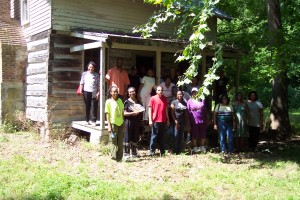
In addition to touring the grounds surrounding the Wessyngton mansion, National Black Arts Festival members and guests walked in the footsteps of Baker’s ancestor in the slave cabin area of the plantation. The group went inside a restored slave cabin built ca. 1830. In 1860, there were 274 enslaved African Americans on the plantation, housed in forty log cabins. At the onset of the Civil War, Wessyngton held the largest African American population in the state of Tennessee and was the largest tobacco producer in America.
National Black Arts Study Group at Wessyngton Plantation
Sunday, June 13th, 2010Today I had the honor of conducting a study group tour of Wessyngton Plantation for Dr. Collette Hopkins, Director of the National Black Arts Festival of Atlanta, along with a number of her colleagues and distinguished guest. The tour included a visit to the Wessyngton mansion, Washington family cemetery, and a former slave cabin. Participants were told about the lives of enslaved African Americans on the largest tobacco plantation in America and walked in their footsteps.
The above photo was taken at the entrance gate to Wessyngton Plantation where I was told as a small child by my grandfather that was where my ancestors came from. The interest in my family’s history led me on a thirty year journey of discovery and the writing of The Washingtons of Wessyngton Plantation: Stories of My Family’s Journey to Freedom.
Washingtons of Wessyngton Plantation: Stories of My Family’s Journey to Freedom – Resource for Educators and Teachers
Tuesday, February 9th, 2010The Washingtons of Wessyngton Plantation: Stories of My Family’s Journey to Freedom has been released in trade paperback and is an excellent resource for teachers and educators. The book chronicles the African American experience from slavery to freedom. It has more than 100 photographs and portraits of African Americans who were once enslaved. The book covers many aspects of plantation slavery, the Civil War, Reconstruction, Jim Crow, Genealogy, and DNA testing.
http://books.simonandschuster.net/Washingtons-of-Wessyngton-Plantation/John-F-Baker-Jr/9781416567417
Washingtons of Wessyngton Plantation Presented to Gateview Elementary School Students in Portland, Tennessee
Monday, November 30th, 2009On November 20th I had the honor of delivering a presentation about my book The Washingtons of Wessyngton Plantation to the entire fifth grade class at Gateview Elementary School in Portland, Tennessee. More than 100 students attended. Prior to my visit the students had studied the Civil War, which tied into my program. The students were very attentive and had many questions. Following the presentation many of the students expressed an interest in tracing their genealogy.
